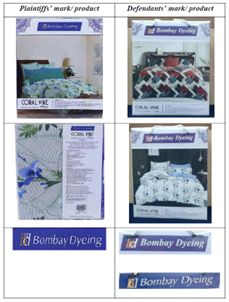In the recent case of Bombay Dyeing And Manufacturing Company Limited vs. Rajesh Gandhi, trading as M/S Branded Stockloters, the Plaintiff filed a suit for an urgent interim relief and appointment of a Local Commissioner against the Defendants. The Plaintiff is a flagship company of Wadia Group, established in 1879, and is one of India's oldest and largest textile producers, operating under the renowned trademark "BOMBAY DYEING".
Apart from forming an integral part of Plaintiff's trading
name, the mark "BOMBAY DYEING" has been
used by Plaintiff since 1879 along with artistic
variations such as  ,
, ![]() and
and  in various classes such as 21, 23, 24, 27 and
35. The Plaintiff also claimed strong sales figures reaching Rs.
50.33 crores and established goodwill and reputation in the
industry. In January 2024, the Plaintiff received information from
its sources about the sale of counterfeit bed linen sold under the
Plaintiff's "BOMBAY DYEING"
trademarks in the markets of Delhi and neighbouring areas of
Meerut, Sardhana, Khatauli and Ghaziabad, Uttar Pradesh. The
Plaintiff then conducted extensive market surveys and learned that
the Defendants are engaged in the manufacturing, packaging, selling
and supply of counterfeit bed sheets bearing
in various classes such as 21, 23, 24, 27 and
35. The Plaintiff also claimed strong sales figures reaching Rs.
50.33 crores and established goodwill and reputation in the
industry. In January 2024, the Plaintiff received information from
its sources about the sale of counterfeit bed linen sold under the
Plaintiff's "BOMBAY DYEING"
trademarks in the markets of Delhi and neighbouring areas of
Meerut, Sardhana, Khatauli and Ghaziabad, Uttar Pradesh. The
Plaintiff then conducted extensive market surveys and learned that
the Defendants are engaged in the manufacturing, packaging, selling
and supply of counterfeit bed sheets bearing  mark in an identical trade dress and overall
packaging as of the Plaintiff's.
mark in an identical trade dress and overall
packaging as of the Plaintiff's.
Defendants No. 1 to 7, who were the sellers of inferior quality counterfeit products, procured these goods from wholesalers and manufacturers based in Meerut and Sardhana towns of Uttar Pradesh. These products were being openly promoted online through social media profiles, YouTube channels and Defendants' websites. The impugned products did not emanate from the Plaintiff and did not comply with the high-quality standards maintained by it. It was submitted that the said unauthorised activities could have a devastating effect on the reputation associated with the Plaintiff's trademarks. A comparison chart of Plaintiff's products with the Defendants' impugned products has been depicted below:

It was held that the above-depicted comparison established a compelling prima facie case of infringement of Plaintiff's trademarks as the impugned products closely mimicked those of the Plaintiff, with only minimal distinctions present. The Defendants' appropriation of the "BOMBAY DYEING" trademark, coupled with their deployment of packaging and trade dress that bears a striking resemblance to the Plaintiff's, created a false impression of genuine origin. It was held that such actions substantially elevate the risk of consumer confusion, leading to instances where customers may inadvertently buy the Defendants' products under the false assumption that they are purchasing genuine "BOMBAY DYEING" merchandise.
It was also held by the Court that such a scenario brought to the fore critical issues of counterfeiting, trademark infringement, and dilution of brand identity, highlighting the potential for significant harm to the Plaintiff's reputation and consumer trust. It was also held that a prima facie case was made by the Plaintiff and that the balance of convenience lay in their favour.
Accordingly, the Court directed the Defendants to refrain from marketing, manufacturing, supplying, selling, packaging or dealing in any manner under the Plaintiff's trademark or any other similar mark and to take down their posts and listings of impugned products available on websites such as YouTube and Instagram. Further, to preserve evidence of infringement, Local Commissioners were appointed to visit the premises of Defendants to conduct search and seizure of infringing products. On the next date of the hearing, the matter was referred to the Mediation Centre since the plaintiff had no objection to exploring the possibility of a settlement. Mediation between the parties is scheduled for August 2024.
The content of this article is intended to provide a general guide to the subject matter. Specialist advice should be sought about your specific circumstances.
We operate a free-to-view policy, asking only that you register in order to read all of our content. Please login or register to view the rest of this article.


